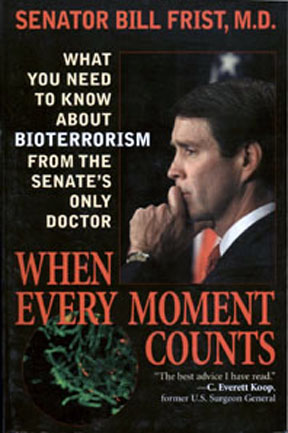|
Web
Exclusives:Features July
7, 2002: Preparing
for the worst
As Frist says in his book, "bioterrorism is now a reality
in the United States." And he predicts that bioterror attacks
are a virtual certainty in our nation's future. "It's no longer
a question of if but when and where and how," he writes. The
nation's experience with anthrax last fall proves our health-care
system was not prepared. "Gaps in our public health system
— the result of 20 years of neglect and underinvestment —
became glaringly apparent," writes Frist, whose own Web site
http://frist.senate.gov/offers
information on bioterrorism and links to related sites. "What
we were discovering was that even the information from the best
medical scientists and public health specialists [about anthrax]
in the United States was wrong. Dead wrong." In an easy-to-read, question-and-answer format, Frist addresses
the issues that are on most people's minds about the various biological
and chemical agents that terrorists might use. He devotes a chapter
to each of the most likely known biological terror agents, discussing
symptoms, how public health officials would likely deal with an
outbreak, what countries have supplies of the agents, and whether
cures or vaccinations are available. Smallpox poses a dangerous threat, writes Frist. Last winter, he
notes, the military held an exercise called Dark Winter that simulated
a smallpox outbreak in the U.S., starting with 20 cases in Oklahoma
City. Within two months, "there would be an estimated 3 million
smallpox cases and up to 1 million deaths" and the disease
would have spread around the world. What would be the impact of a botulism attack? Frist answers: "A
large outbreak could quickly overwhelm the number of available ventilators,
critical care beds, and skilled personnel." Iraq, Iran, North
Korea, and Syria are "believed to be developing botulinum toxin
as a weapon." You get the idea. What can you do to help prepare for another attack? Develop a disaster
plan and assemble a disaster kit, including water and canned food
to last three days, change of clothing, respirators for each family
member, flashlight, cash, sleeping bags, medicines, and plastic
tape to seal windows — so that your family could be self-sufficient
for several days after an attack. Frist recommends determining a
family meeting place outside your neighborhood in case you can't
get home and designating a "safe room" in your house,
with a radio and telephone in case officials tell the public to
shelter at home. Agroterrorism — the use of biological weapons against animals
and crops —wouldn't cause human sickness and death but it would
disrupt our food supply. "The economic impact of agroterrorism
could be staggering," he writes. On the brighter side, our water supply seems to be fairly protected
from a bioterrorist attack because it would require "truckloads
of biochemical agents that would be difficult to produce and relatively
easy to spot." And "any biological agent put in the water
at its source would be so diluted that it would have no effect by
the time it came out of your faucet." Frist tries to reassure readers: "In our federal, state, local,
and private health systems, we have all the pieces we need to wage
an effective defense against bioterrorism. We just need to coordinate
those pieces in a seamless way." In the end, he sounds confident
that the U.S. can meet the challenges ahead. We'll see. By K.F.G.
|

 If
you are a worrier, you might not want to read Senator Bill Frist
'74's book on bioterrorism, When Every Moment Counts: What You
Need to Know About Bioterrorism From the Senate's Only Doctor,
published this year. In it, he details the most likely agents of
bioterrorists, including anthrax, smallpox, and plague. And he looks
at how terrorists could distribute chemical weapons and contaminate
our food and water supplies. It's not a pretty picture.
If
you are a worrier, you might not want to read Senator Bill Frist
'74's book on bioterrorism, When Every Moment Counts: What You
Need to Know About Bioterrorism From the Senate's Only Doctor,
published this year. In it, he details the most likely agents of
bioterrorists, including anthrax, smallpox, and plague. And he looks
at how terrorists could distribute chemical weapons and contaminate
our food and water supplies. It's not a pretty picture.